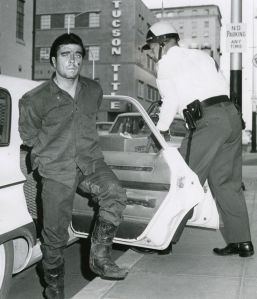As much as I crave a good book about murder or a crime scene photo to dissect, nothing compares to a musical ballad about murder and mayhem. One of my old favorites is a rendition of “Knoxville Girl” by the Louvin Brothers off the Tragic Songs of Life album (1956). These country brothers crooned about the violent riverside murder of an unnamed young woman by her suitor. Voices sweet and lamenting, the Louvin brothers obscured the shock of violence with their lullaby composition.
“I met a little girl in Knoxville, a town we all know well,
And every Sunday evening, out in her home I’d dwell,
We went to take an evening walk about a mile from town,
I picked a stick up off the ground and knocked that fair girl down.”
You can only imagine where it goes from there. Listen here.
The Louvin Brothers can’t be credited with inventing the murder ballad. In fact, “Knoxville Girl” is based on an old Irish ballad, “The Wexford Girl”, which has a more elaborate warning against murdering your loved one. Murder Ballads can be traced back even further to England and to the broadsheet ballad “The Cruel Miller” and well, it’s anyone’s game from there.
Now, take the traditional murder ballad and mix it with the poetry of a notorious serial killer, with a nod toward Joyce Carol Oates, and you have Jon Derosa’s “Ladies in Love.” Based on a poem of the same name by Charles Schmid, Jr., DeRosa weaves some lines from Schmid’s prison writing into his evocative ballad and gives us a precise window into the macabre mind of The Pied Piper of Tuscon. For those of you who don’t know, Schmid was an odd character who wreaked havoc on the city of Tucson in the 1960’s and served as the inspiration for Joyce Carol Oates’ short story, Where are You Going and Where Have You Been?

Photo courtesy of the Tucson Citizen.
He blurred his natural attractive features with cartoonish makeup and clothing, turning himself into a minstrel Elvis Presley – dark tan pancake makeup, white lipstick and the King’s jet black mane. He added his own touches too: a beauty mark on his cheek made from a mixture of putty and axle grease and oversized cowboy boots stuffed with detritus to make him seem taller, attempts at being a more appealing lady magnet to the disaffected youth of Tuscon.
Here, DeRosa has crafted a hauntingly beautiful murder ballad with flutes and woodwinds by Jon Natchez (of Beirut/Yellow Ostrich) and gentle violins and cellos by Claudia Chopek and Julia Kent, respectively. Schmid’s chilling proclamation that “ladies should never fall in love,” is sung sweetly, like a lullaby by DeRosa. And Schmid’s poetic line about women’s voices “being like small animals waiting to be fed” is seemingly easier to take here, layered and somber. But, his complicated and perverse relationship with his victims isn’t celebrated here; instead, DeRosa’s tale of woe serves as a time capsule of terror that I believe, deserves a place in the history of disquieting murder ballads.
Listen to “Ladies in Love” exclusively on The Abbott Gran Medicine show:
http://soundcloud.com/jonderosa/jon-derosa-ladies-in-love
Jon DeRosa’s Anchored EP can be picked up on Itunes or here.

